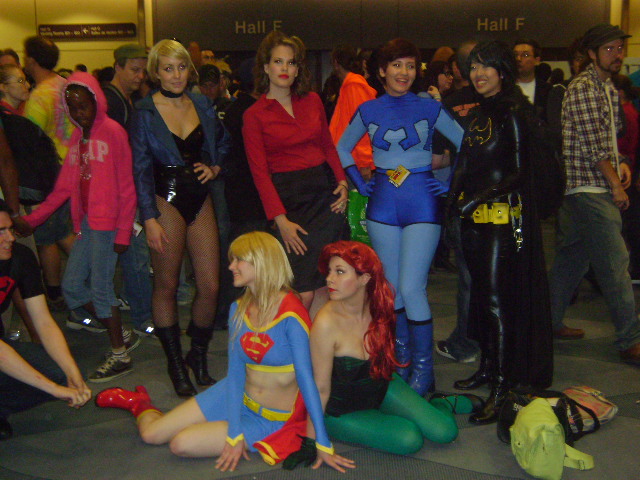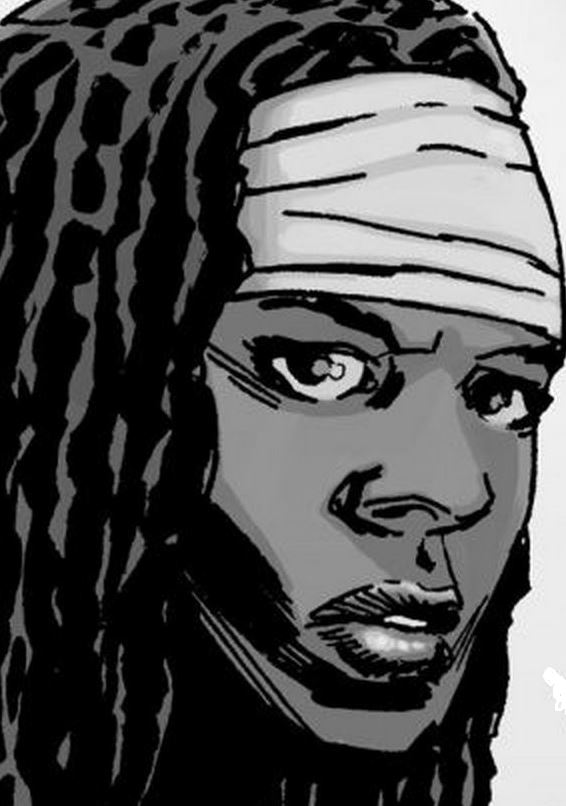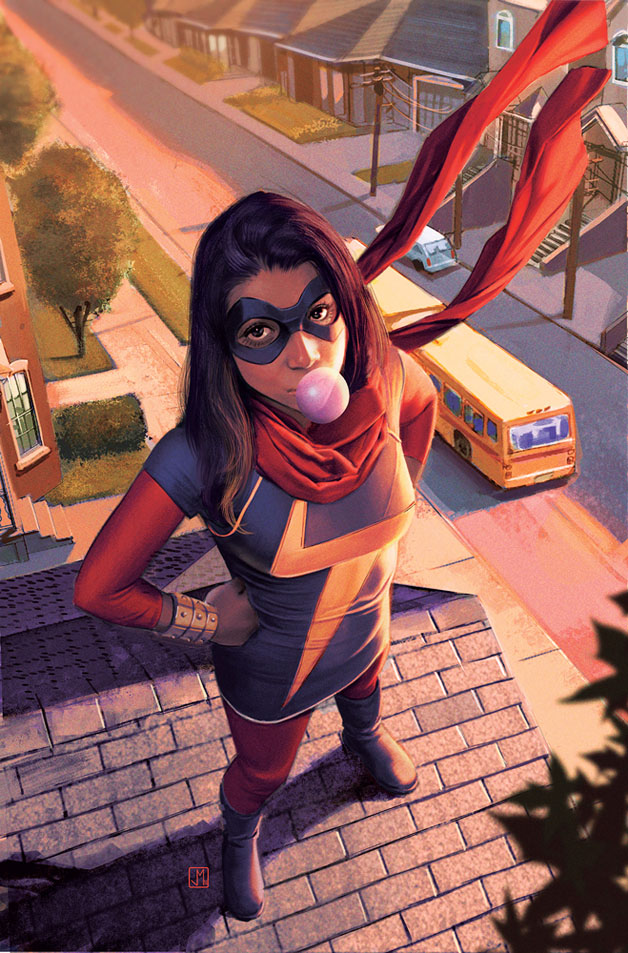Note: This article originally appeared in 2014 on www.berkeleyplace.blog. I am moving all my comic book material to this new, splendid site, and reprinting old posts for posterity, without revision, in case you’re all looking for back-issues to enjoy.

This list is sort of a post-script, which I thought of as I looked over my list and realized that in 2014—for the first time I can remember—I really noticed how many strong female-centric comics there were. Normally, I don’t look at issues like race and gender in comics because (a) it’s almost always white male so there isn’t much to discuss; and (b) I don’t really like to focus on these types of polarizing issues on this site. My blog is about love, not politics.
But as I looked over my list—including the entries I had to cut because I wanted to keep my list to a manageable length—it was indisputable.
2014 was a good year for women in comics.
Many of these entries are also on my “Best of the Year” list, but I’m writing this one in case you’re interested in seeing how the comic industry is treating women these days. Because I assure you, things have changed!
10. Black Widow (Marvel). Natasha Romanov’s solo book written by Nathan “The Activity” Edmondson and illustrated by fan favorite Phil Noto has been an interesting redefinition of the character. Or maybe I should say “Disneyfication.” She’s supposed to be a black op assassin, but she barely ever kills anyone. This is really an action book, and in many ways the stories could fit a male as well as a female lead—corrupt spies kidnap and kill and blackmail each other, and Black Widow is there to foil them. Couldn’t you see Hawkeye, Winter Soldier, Nick Fury, or even a younger Captain America doing just about the same thing? But in a way, that’s as pro-female as anything else: If a man can do it, so can a woman, so why not let her? See Also: Secret Avengers (Marvel), in which Widow and Spider-Woman are an awesome, hilarious comedic team (and which plays much more specifically to their female sides).

9. Lazarus (Image). Less about feminism than socialism, Forever Carlyle is the central character to Greg Rucka and Michael Lark’s tale of a future in which the poor are all slaves—but some are treated better than others. I really like the approach to female sexuality in this comic, as Forever is a soldier first and foremost but, in a recent storyline, she was asked to use her sexuality to support her family’s negotiation strategy. Being that she was raised to be asexual and think only of combat, she was confused and naïve in matters of physical contact (even dancing!)—so we got to see this beautiful and deadly female exploring feelings of sexuality. Great character moments in this underrated comic. See Also: Velvet (Image), Ed Brubaker and Steve Epting’s story about a female spy forced to turn against her masters.
8. Saga (Image). Saga is quite simply the greatest comic of all time. Having said that, it’s also got a great track record as far as female characters go. About 40% of the story is told from the “mother/wife” perspective (Alana), and 15% is narrated by the daughter. And then there are great female side characters, from terrifying villains to a cheerful ghost. The representation of the Y chromosome in Saga is so natural that you forget how different it is from most other comic books out there. Still, it’s not technically a femalecentric book, so it doesn’t rate higher on this particular list. See Also: Alex and Ada (Image), another example of a book that’s at least half-told from a male perspective (and the female is his robot lover), but nonetheless explores issues of gender identity and equality without being obvious, and does so in a science fiction context.

7. Wonder Woman, and Sensational Comics (DC). 2014 was the year Wonder Woman became a cinematic reality. Or at least it was pretty much a sure bet she’d be in a movie soon. Diana Prince had a pretty good year in the comics as well. Brian Azzarello and Cliff Chiang wrapped what by any standard has to be measured as the definitive run for the modern Wonder Woman, and by most standards should be thought of as one of the best Wonder Woman comics of all time. True, it ended with a whimper not a bang, but there were still some fine moments in 2014. Add to that issues of the digital-only Sensational Comics created by the likes of Gail Simone and Gilbert Hernandez, and some good appearances in Superman/Batman, and this is a good time to get familiar with the world’s most famous female superhero. See also The Secret History of Wonder Woman, which is not a comic—it’s a history book, by Jill Lepore, about the character and how she transformed from a bondage sex symbol to a feminist icon.

6. The Kitchen (Vertigo). Mobster wives take on the family business in Hell’s Kitchen during the 1970s. This series has barely started, but it’s off to a fine run. Women pushed into a man’s world when the husbands disappear isn’t necessarily a new theme, but it works—and we all know Peter Milligan knows how to write. See Also: The Names (Vertigo), in which a widow pursues the secrets behind her husband’s death and is thrust into his world of secret agents and conspiracy.
5. Hawkeye (Marvel). The solo series that started out being about Clint Barton ended up being more about his ward, Kate Bishop. Great character development of this former Young Avenger, and terrific “mommy issues” stories revolving around Madame Masque as well. We get to see Kate become a private investigator and, in so doing, show up her mentor time and again. In a lot of ways, it reminded me of Alias, Brian Michael Bendis’ masterpiece about what it’s like to be a private detective who is also a superhero. See Also: She-Hulk, Charles Soule and Javier Pullido’s wonderful comic book about what it’s like to be a lawyer who is also a superhero.


4. Rachel Rising (Abstract Studios). This is a book I’ve been shouting about for years, so if nothing I’ve said so far makes you want to buy a book about modern-day witches that’s beautiful, frightening, and provocative, I doubt I can change your mind now. See also: The Walking Dead (Image). When the zombie apocalypse comes, gender won’t matter. Lots of strong women in this comic, including the biggest African American badass in comics: Michonne!
3. This One Summer (First Second). A touching tale of a girl hitting puberty. I’ve never experienced that myself, being a guy, but I imagine that there’s a lot here that will resonate: Realizing the limitations of your parents (particularly the father who you used to think hung the moon); having your first crush and realizing the guy is kind of a sex-hungry dick; and the still-innocent (but not as innocent as before) pleasures of swimming, playing in the woods, and reading a good book. See Also: The Adventures of Superhero Girl (Dark Horse), the Eisner-award-winning comic by Faith Erin Hicks that’s mostly about being a girl, and partly about being a superhero. She has fun with her powers, just like Spider-Man used to, and it doesn’t stop her from living her life.

2. Ms. Marvel (Marvel). I’ve been singing this book’s praises all year, no sense in stopping now. See Also: Storm (Marvel). If you like Ms. Marvel’s superheroics, you might also like this solidly good book about everyone’s favorite X-(wo)Man with a mohawk.
1. Bitch Planet (Image). The plot? Women’s Prison on the Moon. The concept? Violence and nudity and revenge. Sounds like 1970s sexploitation, doesn’t it? But the real story here is the depiction of a future in which “non-compliant” women (which includes women whose husbands have affairs) are locked away from view. It’s about how women aren’t held responsible for their own behavior but rather for the behavior of men—because the world is all about men. You can read whatever issue-of-the-day you like into this: Abortion, equal pay, sexual harassment and rape, it all fits. But the women in this comic don’t act like feminists—they’re just regular people, angry and bullied by the system. This book redefines the sexploitation trope. See Also: Red Sonja (Dynamite), in which Gail Simone redefines the pin-up character as a woman of strength and power—changing the origin story from Sonja being raped to Sonja scaring the hell out of some would be rapists.

